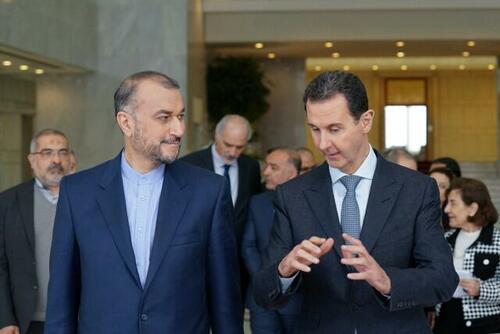
Iran's foreign minister has revealed the content of secretive back channel talks with Washington, and this marks rare positive news to come out of a Middle East which remains on knife's edge amid the Gaza conflict. The very fact of these quiet discussions over red lines suggests both sides are legitimately interested in restraint related to broader tensions outside Gaza. However, a dangerous tit-for-tat has ensued at US bases in Iraq and Syria.
Iran's top diplomat Hossein Amirabdollahian has said in a fresh interview with FT that Tehran does not want to escalate with Israel and the United States, and doesn't want to see the war centered on Israel and Hamas spiral further. He said this despite the now daily exchanges of fire involving Hezbollah along the Lebanese border. In the backdrop, Washington is rumored to be very hesitant at this point on censuring Iran over any development on its nuclear program.

However, Amirabdollahian did threaten that if there's no end to Israel's attacks on Gaza and the West Bank, in which over 11,300 Palestinians have died, Iran will have to escalate - though he didn't define what that means.
"Over the past 40 days, messages have been exchanged between Iran and the US, via the US interests section at the Swiss embassy in Tehran," FM Amirabdollahian said.
"In response to the US, we said that Iran does not want the war to spread, but due to the approach adopted by the US and Israel in the region, if the crimes against the people of Gaza and the West Bank are not stopped, any possibility could be considered, and a wider conflict could prove inevitable," he emphasized.
Currently, there's consensus that Iran-backed Lebanese Hezbollah has indeed held back significantly. Many Palestinian supporters hoped that in Secretary-General Hassan Nasrallah's two speeches during the conflict he would have declared war. But that full war declaration from Hezbollah has not come.
Interestingly, Amirabdollahian described that while Washington is demanding that Tehran "exercise restraint" - the US itself is not, especially given it dispatched two carrier strike groups to the region and a nuclear-powered submarine, along with a troop build-up.
According to his words in FT:
He said the US’s messages to Hizbollah similarly urging restraint "would fail to make the resistance group cautious in its decision-making."
"Our military officials are of the opinion that the deployment of US aircraft carriers near our region, which makes them accessible, is not a strong point for the US. Rather, it makes them more vulnerable to possible strikes," Amirabdollahian said.
"The war has already expanded in the region," he added. And then commented on the Yemeni Houthis, which have several times at this point launched missiles and drones toward Israel.
Defense Ministry publishes footage showing the launch of an Arrow missile this week, intercepting a missile launched by the Iran-backed Houthis in Yemen at Eilat. pic.twitter.com/l9V4dsOeuh
— Emanuel (Mannie) Fabian (@manniefabian) November 17, 2023
"The fact that the Yemeni army [Iran-backed Houthi movement] . . . attacks the occupied lands with missiles and drones means the war has begun to expand. The fact that Hizbollah is fighting with a third of the Israeli army shows the war has expanded," the foreign minister said.
US and Israeli warships have over the past month stepped up their presence particularly in the Red Sea, to monitor for projectiles fired out of Yemen. Already on at least two occasions, a US warship has intercepted hostile projectiles inbound toward Israel. In this 'limited' way the Pentagon has already 'intervened' in the Israel-Gaza war.
Iran’s foreign minister has revealed the content of secretive back channel talks with Washington, and this marks rare positive news to come out of a Middle East which remains on knife’s edge amid the Gaza conflict. The very fact of these quiet discussions over red lines suggests both sides are legitimately interested in restraint related to broader tensions outside Gaza. However, a dangerous tit-for-tat has ensued at US bases in Iraq and Syria.
Iran’s top diplomat Hossein Amirabdollahian has said in a fresh interview with FT that Tehran does not want to escalate with Israel and the United States, and doesn’t want to see the war centered on Israel and Hamas spiral further. He said this despite the now daily exchanges of fire involving Hezbollah along the Lebanese border. In the backdrop, Washington is rumored to be very hesitant at this point on censuring Iran over any development on its nuclear program.

However, Amirabdollahian did threaten that if there’s no end to Israel’s attacks on Gaza and the West Bank, in which over 11,300 Palestinians have died, Iran will have to escalate – though he didn’t define what that means.
“Over the past 40 days, messages have been exchanged between Iran and the US, via the US interests section at the Swiss embassy in Tehran,” FM Amirabdollahian said.
“In response to the US, we said that Iran does not want the war to spread, but due to the approach adopted by the US and Israel in the region, if the crimes against the people of Gaza and the West Bank are not stopped, any possibility could be considered, and a wider conflict could prove inevitable,” he emphasized.
Currently, there’s consensus that Iran-backed Lebanese Hezbollah has indeed held back significantly. Many Palestinian supporters hoped that in Secretary-General Hassan Nasrallah’s two speeches during the conflict he would have declared war. But that full war declaration from Hezbollah has not come.
Interestingly, Amirabdollahian described that while Washington is demanding that Tehran “exercise restraint” – the US itself is not, especially given it dispatched two carrier strike groups to the region and a nuclear-powered submarine, along with a troop build-up.
According to his words in FT:
He said the US’s messages to Hizbollah similarly urging restraint “would fail to make the resistance group cautious in its decision-making.”
“Our military officials are of the opinion that the deployment of US aircraft carriers near our region, which makes them accessible, is not a strong point for the US. Rather, it makes them more vulnerable to possible strikes,” Amirabdollahian said.
“The war has already expanded in the region,” he added. And then commented on the Yemeni Houthis, which have several times at this point launched missiles and drones toward Israel.
Defense Ministry publishes footage showing the launch of an Arrow missile this week, intercepting a missile launched by the Iran-backed Houthis in Yemen at Eilat. pic.twitter.com/l9V4dsOeuh
— Emanuel (Mannie) Fabian (@manniefabian) November 17, 2023
“The fact that the Yemeni army [Iran-backed Houthi movement] . . . attacks the occupied lands with missiles and drones means the war has begun to expand. The fact that Hizbollah is fighting with a third of the Israeli army shows the war has expanded,” the foreign minister said.
US and Israeli warships have over the past month stepped up their presence particularly in the Red Sea, to monitor for projectiles fired out of Yemen. Already on at least two occasions, a US warship has intercepted hostile projectiles inbound toward Israel. In this ‘limited’ way the Pentagon has already ‘intervened’ in the Israel-Gaza war.
Loading…





